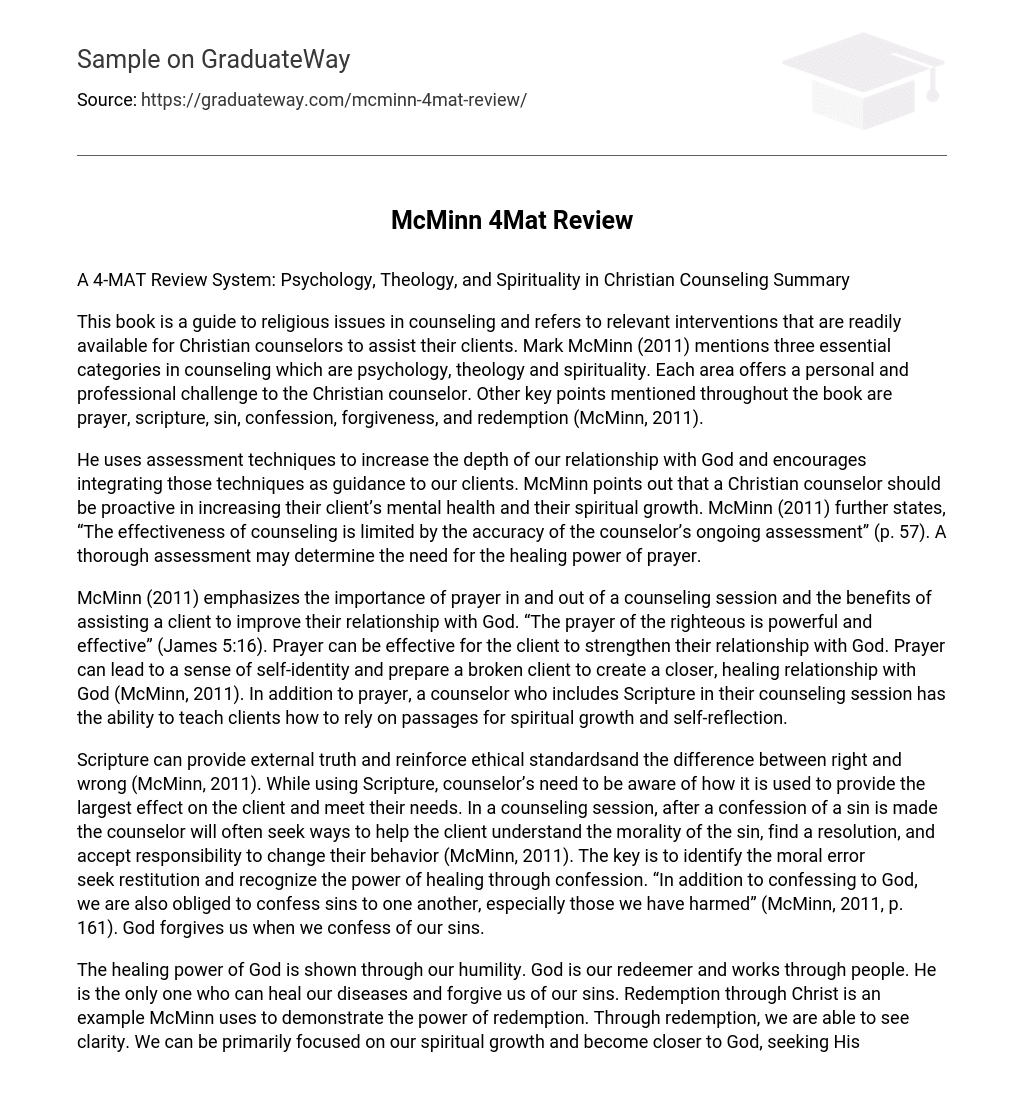A 4-MAT Review System: Psychology, Theology, and Spirituality in Christian Counseling Summary
This book is a guide to religious issues in counseling and refers to relevant interventions that are readily available for Christian counselors to assist their clients. Mark McMinn (2011) mentions three essential categories in counseling which are psychology, theology and spirituality. Each area offers a personal and professional challenge to the Christian counselor. Other key points mentioned throughout the book are prayer, scripture, sin, confession, forgiveness, and redemption (McMinn, 2011).
He uses assessment techniques to increase the depth of our relationship with God and encourages integrating those techniques as guidance to our clients. McMinn points out that a Christian counselor should be proactive in increasing their client’s mental health and their spiritual growth. McMinn (2011) further states, “The effectiveness of counseling is limited by the accuracy of the counselor’s ongoing assessment” (p. 57). A thorough assessment may determine the need for the healing power of prayer.
McMinn (2011) emphasizes the importance of prayer in and out of a counseling session and the benefits of assisting a client to improve their relationship with God. “The prayer of the righteous is powerful and effective” (James 5:16). Prayer can be effective for the client to strengthen their relationship with God. Prayer can lead to a sense of self-identity and prepare a broken client to create a closer, healing relationship with God (McMinn, 2011). In addition to prayer, a counselor who includes Scripture in their counseling session has the ability to teach clients how to rely on passages for spiritual growth and self-reflection.
Scripture can provide external truth and reinforce ethical standardsand the difference between right and wrong (McMinn, 2011). While using Scripture, counselor’s need to be aware of how it is used to provide the largest effect on the client and meet their needs. In a counseling session, after a confession of a sin is made the counselor will often seek ways to help the client understand the morality of the sin, find a resolution, and accept responsibility to change their behavior (McMinn, 2011). The key is to identify the moral error seek restitution and recognize the power of healing through confession. “In addition to confessing to God, we are also obliged to confess sins to one another, especially those we have harmed” (McMinn, 2011, p. 161). God forgives us when we confess of our sins.
The healing power of God is shown through our humility. God is our redeemer and works through people. He is the only one who can heal our diseases and forgive us of our sins. Redemption through Christ is an example McMinn uses to demonstrate the power of redemption. Through redemption, we are able to see clarity. We can be primarily focused on our spiritual growth and become closer to God, seeking His will (McMinn, 2011). “Counseling provides opportunities to be redemptive agents in a fallen and needy world” (McMinn, 2011, p.222). Reflection
The book is an excellent resource for counselors to use in their counseling session. It is a great guide for implementation of inter-disciplinary integration. There was a lot of emphasis on theology and integrating those concepts with the psychology of the counseling session. Often times there were conflicting ideals in the book that were confusing. McMinn (2011) mentioned the importance of a thorough assessment of the client at the beginning of a session to ensure the clients needs and expectations are met.
I learned a lot from this book in regards to integrating psychology and spirituality into my counseling sessions. I enjoyed reading McMinn’s (2011) examples of counseling situations and it really made me reflect how I would handle each situation. I really like how he gives examples and supports it with documented evidence. He effectively uses Scripture and intellectual evidence in his examples.
Action
I believe teaching the client about quality time with God is something that I need to improve upon as a counselor. Prior to any session, I will ensure that I thoroughly assess my client to establish expectations in the session. I will assess the client’s problems to indicate where it would be appropriate to use prayer and scripture whether in or out of the counseling session. I will establish a respect from the client and trust that will allow the client to be comfortable and open minded.
I will assume a mentor role and provide homework from Scripture so that the client learns how to use meditation, Scripture, and prayer effectively. I will teach them that confession of their sin is a step closer to a relationship with God and show them that it is okay to be humbled. God is our redeemer and will show us truth through His word.
Reference
McMinn, M. R. (2011). Psychology, theology, and spirituality in Christian counseling (Rev. ed.). Carol Stream, IL: Tyndale House.





